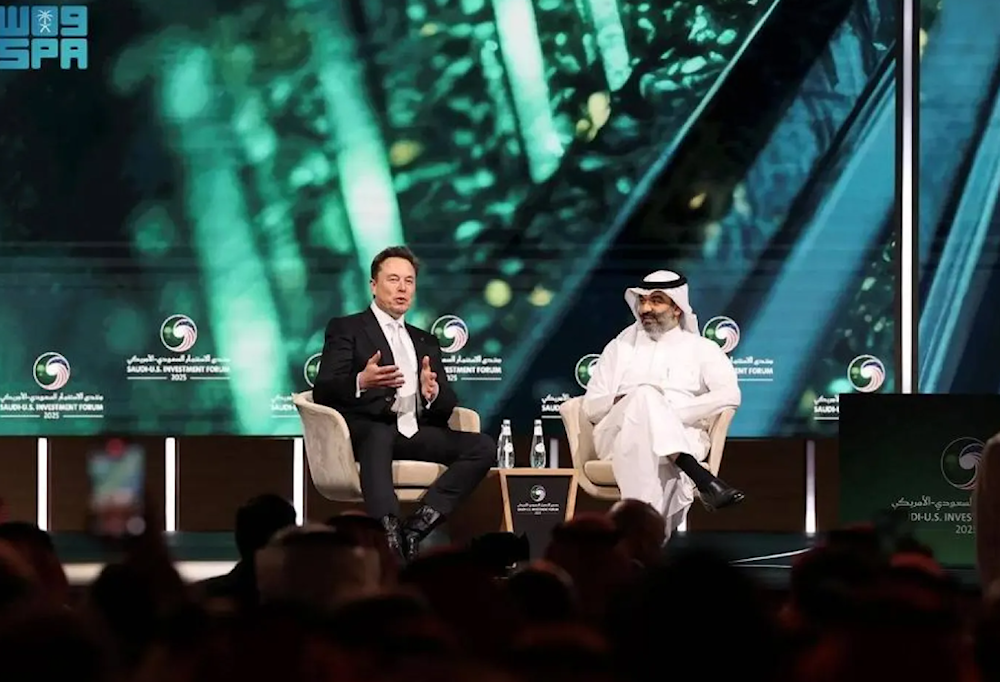Gulf investments quietly boosted Elon Musk and family fortunes
During Trump’s Gulf visit, Elon Musk secured major deals for SpaceX and Neuralink, deepening his family’s financial ties in the region and raising questions about political access and influence.
-

Tesla, SpaceX, and xAI CEO Elon Musk and Saudi Minister of Communications and Information Technology Abdullah Alswaha speak at the Saudi-US Investment Forum in Riyadh on May 13, 2025. (Saudi Press Agency)
President Donald Trump's recent trip to the Gulf garnered attention not just for the confluence of US foreign policy and his family's financial interests, but also for high-profile agreements negotiated by Elon Musk, The New York Times reported.
Accompanying Trump on his state visit to Saudi Arabia, Musk—the world’s richest man—announced that his company SpaceX had received approval to provide Starlink satellite internet services to businesses in the kingdom.
As Trump continued to Abu Dhabi, Musk’s other company, Neuralink, revealed it had struck a deal with the local health ministry to launch a clinical trial of its brain implant technology in the UAE.
Musk's expanding business footprint in the Gulf
While the financial terms of both agreements remain undisclosed, Bloomberg later reported that SpaceX is also in talks to offer Starlink internet services to Emirates Airlines, which is state-owned.
Musk holds an unusually influential position, even within an administration known for breaking governance and private sector engagement conventions. He has attended cabinet meetings and wields significant authority to influence or halt government programs—all while leading companies that benefit heavily from federal contracts and international deals.
Musk and his family also have financial interests in the Gulf, and for years his ventures secured funding from state-linked and regional investment funds in the Gulf. One notable backer is Vy Capital, a Dubai-based firm that has supported at least five Musk-led companies. SpaceX, for instance, provides launch services for Emirati satellites, and in February, Musk’s Boring Company signed an agreement with Dubai’s transit authority to develop an underground transportation system in the city.
While in Riyadh last week, Elon Musk expressed interest in having the Boring Company collaborate with Saudi Arabia. He also attended a lunch with Saudi and American officials, joined by other business leaders.
His brother, Kimbal Musk, was also on the White House guest list; his company, Nova Sky Stories, recently secured deals with Qatar and Abu Dhabi to produce large-scale drone light shows, including one in Abu Dhabi featuring 10,000 drones—touted as the world’s largest.
Family ties and influence in the Gulf
Earlier this year, Maye, the mother of Kimbal and Elon, appeared at a government conference in the UAE, while Errol Musk, Elon’s father, announced plans to build a “Musk Tower” in Dubai in partnership with an Emirati firm. The tower would house a Musk Institute focused on gravity and space-time research. Errol, who has a strained relationship with Elon, said his son is not involved in the project.
He also claimed to be raising up to $200 million through his cryptocurrency, MuskIt, whose valuation has since plunged from $500 million to under $1.5 million.
Errol Musk’s foray into digital currency mirrors efforts by the Trump family. At a major crypto conference in Dubai last month—just two weeks before both Donald Trump and Elon Musk visited the region—Eric Trump announced a $2 billion business deal involving the Trump Organization’s digital coin and a state-backed Emirati firm.
Matthew Hedges, a researcher at Durham University and expert on Gulf security services, noted that Emirati intelligence likely seeks out individuals in Trump’s close orbit who have presidential access but face limited oversight. That, he said, makes figures like Elon Musk and his family appealing targets.

 4 Min Read
4 Min Read








